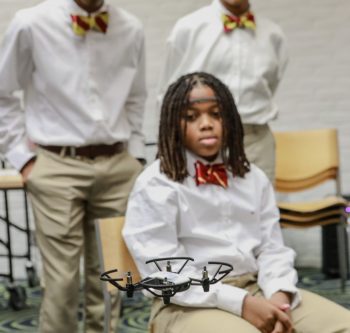
Dr. Chris S. Crawford, associate professor in the Department of Computer Science and director of the Human-Technology Interaction Lab, led a STEM workshop on Oct. 6 for a group of middle and high school students participating in the Columbia, Maryland, alumni chapter of the Kappa Alpha Psi Fraternity Inc.’s Kappa League Program, which focuses on leadership and academic achievement of young men.
The workshop allowed the children to race drones with their thoughts using Crawford’s brain-computer interface technology software, NeuroBlock, and Muse headsets that monitor brain activity.
“We believe that our next generation of scientists will push this technology far beyond anything we can currently imagine,” Crawford said. “That’s why our NeuroBlock software is written in a way that allows kids to program machines to respond to electrical signals from the brain.”

BCI technology has drawn interest from the public and investors throughout its development, but the technology is still experimental. Crawford, however, is pursuing non-invasive technology which he aims to make accessible to the masses as an education tool. His workshop curriculum, “brain drone racing,” allows students to use Muse 2 headsets to race their drones against one another using their brain activity as an interactive way to engage young people and encourage interest in physiological computing.
“It was an incredible display of science and innovation that you really have to see to believe,” Kappa League Chair Arinze Ifekauche said. “Parents got to watch their children program drones to fly in different directions and follow several different thought commands in real time. When we were in the room, it really felt like we were a part of something historic.”
The workshop and a live TV demonstration preceded NeuroBlock’s public release. NeuroBlock, a programming environment designed to support the development of simple BCI applications, has been used by students as young as 13 to gain first-hand experience in physiological computing.

Crawford’s work is directly funded by the National Science Foundation. The Brain Drone Racing League was co-founded by Dr. Marvin Andujar alongside Crawford. Crawford is also collaborating with Betabox Learning to expand access to brain-computer interface education.